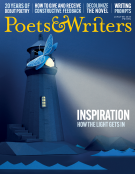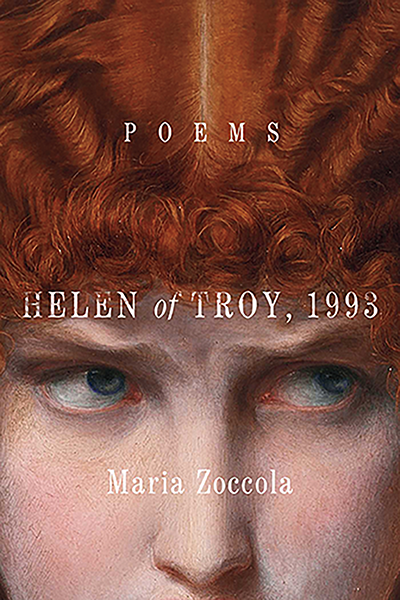At a dinner table packed with writers and book people at the 2024 Western Carolina University Spring Literary Festival, held in April in Cullowhee, North Carolina, the cofounder of Gold Leaf Literary, Lauren Harr, told me that what she finds most interesting about a poetry collection is what has been left out of it. The maybe-poems, she meant. The almosts. The poems dropped on the floor early in the editing process, even before the manuscript is sent to contests and open reading periods. The pieces yanked out at the last minute, right before the collection begins production at its press. I understood exactly what Harr was talking about: the poems that haunt a book from the outside.
The idea of these hauntings grew roots in me. When I pictured the bookshelf in my study, every collection now seemed attended by ghost pages, a kind of hidden B-side for the writer’s eyes only—and I wanted in on the secret. I had hardly stepped off the plane back home in Memphis before I was messaging other poets, asking them to reveal the poems they cut from their books and the reasons for such pruning. I figured nearly everyone would have a story to tell—I’ve never known a poet to have an easy time pulling together a manuscript. It’s a grueling process: the indecision of choosing the poems that will be incorporated, the frustration of establishing the order of the table of contents, the endless late-night second-guessing of every piece in the stack. (Is this even a good poem? Am I even a good poet? Should I rewrite the whole thing from scratch?) There’s a reason poets often post photos to social media of their living-room rugs awash in seas of white printer paper, the poets themselves capsized survivors paddling for dear life in the midst of it all.
I remember long hours of stalking up and down the rows of pages laid out on the floor for my own debut collection, Helen of Troy, 1993, published by Scribner in January. The collection reimagines the Homeric Helen as a dissatisfied homemaker in small-town Tennessee in the early nineties, rolling through football games and Chuck E. Cheese and the local Piggly Wiggly in a breakneck series of persona poems that turn the Iliad on its head. I spent about a year and a half writing Helen poems before I felt ready to pull together the whole book—but not every Helen poem in my stack slotted neatly into a cohesive collection. The pieces I left behind were good poems, and I still considered them part of Helen’s world. They simply didn’t fit into the thematic arc I was building.
Similar stories turned up from other poets I asked, including Jenny Sadre-Orafai. Sadre-Orafai’s ocean-soaked book of prose poems, Dear Outsiders (University of Akron Press, 2023), follows a pair of siblings swallowed up by the natural world of first their seaside hometown and then, after disaster strikes, a lonesome wooded mountain. The book arrived for Sadre-Orafai in nearly a single breathless gasp during her residency at the Hambidge Center in Rabun Gap, Georgia. She hammered out about fifty-five prose poems one after another in the space of a week, born from the dread of losing loved ones and the memory of a fraught, othered childhood in Chattanooga. And then the cutting began. The poems arising from her Tennessee childhood felt exposing and vulnerable yet full of potential energy, demanding further exploration that Dear Outsiders couldn’t offer them in its current structure. “I hadn’t addressed Chattanooga as much in my work up until then, and I wanted to stay there, to write about the experiences I had there and how I was made to feel, but a lot of times it felt like I was saying the same thing over and over, not advancing the narrative,” Sadre-Orafai says. The Chattanooga poems were removed but even now remain part of the landscape of the book in their absence: They’re the poems that helped her understand the structure of the book’s second half, anxious and atmospheric with an undercurrent of surveillance.
In my conversations with poets on this topic, I noticed time and again that the poems dropped from a collection often represented pieces their creators were especially proud of and that many had been previously published in journals and magazines. Rather than being at all weak in execution, these poems simply existed in a space slightly outside of the work the books were called to do and, as such, needed to be gently lifted away. Kathryn Bratt-Pfotenhauer, for instance, removed a poem called “The Philosopher” from their collection Bad Animal (Riot in Your Throat, 2023) for examining a grief beyond the collection’s thematic scope. Rajiv Mohabir pulled the poem “Summer” from Whale Aria (Four Way Books, 2023) for bordering too closely on the sentimental to fit with its neighbors. Carolina Hotchandani left “Coverage” out of The Book Eaters (Perugia Press, 2023) after a complex reimagining of the stories the book needed to hold and the poems that would have to fall away to make room.
Hotchandani’s experience fascinated me. The Book Eaters burrows through shifting states of selfhood: the speaker’s entrance into motherhood, her father’s devastating cognitive decline, the transformation of heritage through multiple generations. And yet the final version of The Book Eaters is very different from the book Hotchandani thought she was ready to publish. “My father passed away one day after I declared The Book Eaters to be complete,” Hotchandani says. “He’s a major figure in The Book Eaters, and his death was sudden—due to a heart attack, which was disconnected from the degeneration I recount in the book. Suddenly I looked at my manuscript differently; it was missing my father’s departure from the world of the living. I decided to edit death into the book, so to speak.” And to pull death in, other strands of the book needed to come out. For example, Hotchandani removed a series of poems that considered the bureaucratic systems governing the American body, such as the need to register her newborn daughter with an insurance company within thirty days of her birth. These bureaucratic poems from The Book Eaters (“Coverage” is one of them) and the Chattanooga poems from Dear Outsiders are inextricably tangled in the larger story of their books’ creation; they float in the dust stirred by the books’ footprint in the world. And even removed from the pages of their initial collections, they represent an impulse of inspiration that has not stopped acting upon their creators. In my discussions with different poets I was struck by how often poets planned to fold their excised poems into future collections better suited to embrace the themes examined within. “Feeling haunted by what I left out of my book compels me to write new poems. That’s the way I write—being haunted as opposed to delighted,” Hotchandani says.
The more I talked with other poets about what had been left out of their manuscripts, the more I began to conceptualize these hauntings as extending beyond the whole poems left lying on the living-room rug. For poets like myself, after all, the final book is only truly final in that it’s the version with an ISBN number printed inside; it’s merely the form of the book that meets the general reader. The real book—the complete book, the whole book—is more of a spiritual concept than a paper-and-ink artifact, a nebulous container holding the words on the page, the words deleted, the words that never made it out of the poet’s head at all. It holds background research, photographs, memories, the voices of loved ones, half-finished couplets jotted down in the corner of a notebook page.
I’ve known authors of fiction who write thousands of words in their characters’ voices before even attempting to begin chapter one. The same is true for many poets, including myself. My background work for Helen of Troy, 1993 included practice runs I took at Helen’s voice, dress-rehearsing her cadence and rhythms, before I began shaping any poems ready for outside eyes. In broken, scribbly stanzas and stream-of-consciousness piles of words, I imagined Helen flipping through an L.L.Bean catalogue, trading penny stocks from her couch, and filling out a high school questionnaire about her future plans. These practice runs aren’t complete poems; that’s not their intended purpose. For me, though, they’re nevertheless part of Helen’s narrative, scenes that happened just off-screen, moments in Helen’s life that I saw but the reader did not.
The audience for Dear Outsiders won’t find evidence of an excised suite of poems arising from an othered childhood. Poems contemplating the bindings of health insurance are absent from The Book Eaters. A reader of Helen of Troy, 1993 has no idea that Helen once took a swing at the stock market. And yet all of these subjects and happenings belong to their respective books in the same way a ghost belongs to its former self, severed from and yet still inextricably tied to its host, floating just outside the sphere of perception. What I like about these hauntings is the way they suggest that a reader’s experience of a collection will always be to some extent incomplete, that the final book is a spotlight trained on a single circle of canvas while the rest of the painting remains in shadow. Our books have secrets. They keep whispering, even after they’re folded closed and returned to the shelf.
Maria Zoccola is a poet and educator from Memphis. Her work has previously appeared in the Atlantic, Ploughshares, the Kenyon Review, the Iowa Review, and elsewhere. Helen of Troy, 1993 (Scribner, 2025) is her debut poetry collection.
Thumbnail credit: Morgan Lyttle








